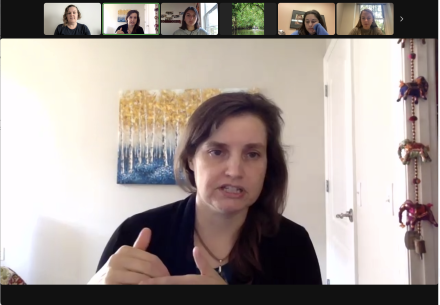Students in Jennifer Eidum's Teaching English to Speakers of Other Languages (TESOL) Theory & Practice course attended a workshop on commitment statements led by Beth Godbee, creator of Heart-Head-Hands: Everyday Living for Justice.
On Wednesday, Oct. 19, Elon student teachers in TESOL: Theory & Practice were invited to consider their teaching motivation and inspiration and how those ideas connect to how they aim to practice in their future classrooms. They were guided in this process by Beth Godbee, creator of Heart-Head-Hands: Everyday Living for Justice, a writer, educator, and former writing studies professor who now offers public education courses, coaching and retreats.

Students prepared for the workshop by reflecting on their prior experiences as students and teachers and the values they hoped to carry into their teaching practice. In the workshop, Godbee clarified the distinction between values and commitments, noting that commitments are dedications or priorities plus follow-through. These statements also differ from the traditional teaching philosophy statement because they are often not publicly shared, but are an opportunity to articulate one’s personal commitments with the goal of consistently revisiting them for update and revision. Godbee shared two examples of commitment statements in practice: the National Council of Teachers of English’s (NCTE) statement on Antiracist Teaching and the Combahee River Collective Statement.
In addition to looking at commitment statements circulating among educators, Godbee led reflective exercises utilizing guided relaxation techniques enabling students to engage with their embodied experiences. Several students noted that these activities were their favorite, as they don’t often have opportunities to connect with their body during learning exercises.
This workshop was developed by Beth Godbee for the English TESOL: Theory & Practice course in collaboration with professor Jennifer Eidum. This course, ENG3060, is a foundational course for the new TESOL minor at Elon. The workshop was supported by a CATL mini-grant, as well as funds from the English department and Department of Education and Wellness.


